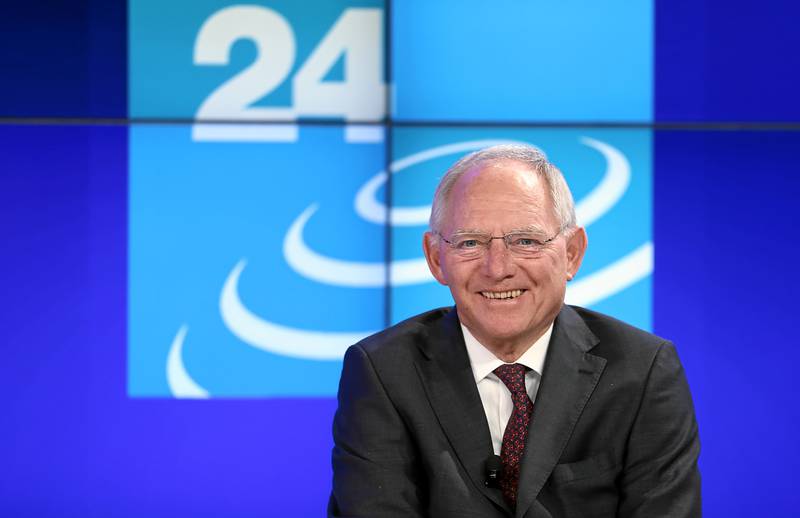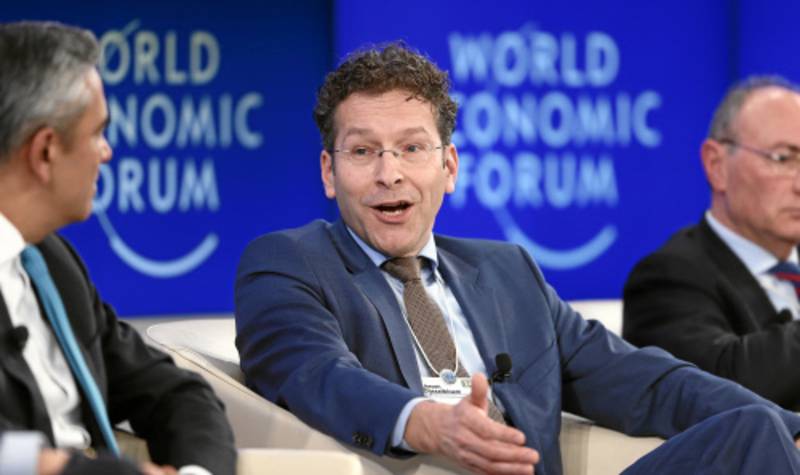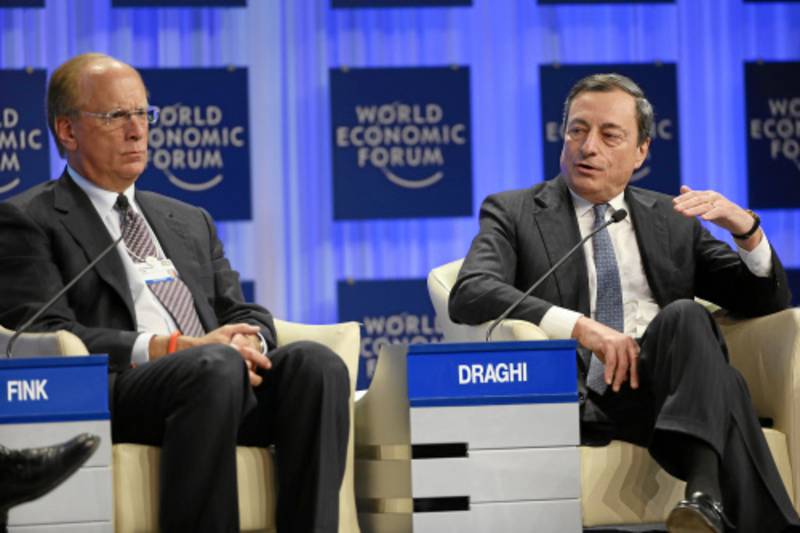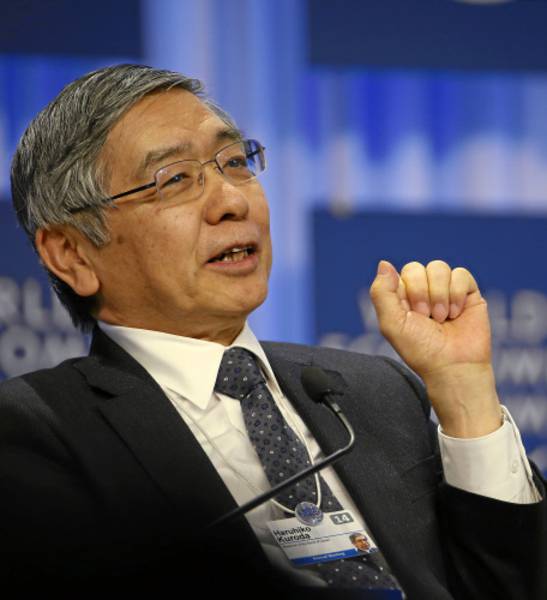Mario Draghi, Abenomics and Ireland Were the Stars of Davos 2014
Adelina Marini, January 28, 2014
 The European economic recovery is a fact, however it is fragile because there is a danger of losing momentum on reforms. Structural reforms are the key and were the two most frequently used words in the context of Europe's exit from the crisis during this year's World Economic Forum in Davos. Generally, the EU's future depends on whether the Union will do the structural reforms. Ireland, in this regard, is the good example. That is why it was one of the stars at this year's forum. However, one of the greatest concerns was whether reforms will continue. "We have to keep the momentum on reforms to fight these unacceptable numbers of unemployment", said Jose Manuel Barroso, the European Commission chief in Davos after congratulating Irish Prime Minster Enda Kenny.
The European economic recovery is a fact, however it is fragile because there is a danger of losing momentum on reforms. Structural reforms are the key and were the two most frequently used words in the context of Europe's exit from the crisis during this year's World Economic Forum in Davos. Generally, the EU's future depends on whether the Union will do the structural reforms. Ireland, in this regard, is the good example. That is why it was one of the stars at this year's forum. However, one of the greatest concerns was whether reforms will continue. "We have to keep the momentum on reforms to fight these unacceptable numbers of unemployment", said Jose Manuel Barroso, the European Commission chief in Davos after congratulating Irish Prime Minster Enda Kenny.
"We believe the informed public opinion should keep the pressure not to give up on reforms", he added and warned: "We cannot go back to business as usual". Barroso was supported by the secretary general of the Organisation for Economic Cooperation and Development (OECD), Angel Gurria, who said that his biggest concern was whether reforms would continue. The only solution is "reforms, reforms, reforms", he said. Swedish Prime Minister Fredrik Reinfeldt joined the reformist group pointing out that a return to business as usual should never be allowed because there always were new market conditions and new business logic. The problem with reforms, though, could be cultural as well, as it became clear from Jose Manuel Barroso's statement who, in the end of his second term as European Commission chief, allows himself more openness on the most sensitive European issues.
Asked about the U-turn Francois Hollande recently outlined in his annual meeting with the press, Mr Barroso explained that the problem in France was cultural. The French are afraid of globalisation and that cannot be overcome by government measures. A cultural change is needed. Not only this. Also necessary is to remove the "absurd borders" that still exist. In Europe, we still do not have a single market, he added thus responding to a Telenor chief who said that after a recent buy-out of a mobile operator in Bulgaria it was easier to start a business in Myanmar than in Europe where one should go country by country.
In Europe we have killed the dragon, now we have to conquer the princess
These words belong to Joe Kaeser, Siemens's CEO. The question, though, is who is the princess. Most European officials in Davos were unanimous that those are structural reforms, but a pressure could be felt by investors and business representatives about something more than this. The elephant in the room was noticed and pointed at by Lord J. Adair Turner, senior fellow at the Institute for New Economic Thinking, a British think-tank. In order for the euro area to really work, it should go to a really deep level of federalisation which will require a treaty entirely tailored to the eurozone. From the words of European Commission's vice president and commissioner for economic and monetary affairs in the EU and the eurozone, Olli Rehn, and also from the words of Germany's omnipotent Minister of Finance Wolfgang Schäuble, it became clear that they, too, have noticed the elephant.
 But as Mr Schäuble explained, first and foremost, the problems of fiscal discipline and structural reforms need to be solved. And then treaty changes will be needed to ensure "a bit more common fiscal policy". "The given European structure, with the legal basis in the treaties, with national fiscal policies, if you want to give up any hope on structural reforms, any ongoing structural policies in Europe, you have to mutualise debt", the German finance minister said. Any mutualisation of debt will lead to suspension of structural reforms and to the end of the success we currently enjoy. It cannot be relied only on monetary policy, he emphasised several times during all his contributions in Davos.
But as Mr Schäuble explained, first and foremost, the problems of fiscal discipline and structural reforms need to be solved. And then treaty changes will be needed to ensure "a bit more common fiscal policy". "The given European structure, with the legal basis in the treaties, with national fiscal policies, if you want to give up any hope on structural reforms, any ongoing structural policies in Europe, you have to mutualise debt", the German finance minister said. Any mutualisation of debt will lead to suspension of structural reforms and to the end of the success we currently enjoy. It cannot be relied only on monetary policy, he emphasised several times during all his contributions in Davos.
The existing founding treaties of the EU, practically, impede the radical solution of the issue. Wolfgang Schäuble explained the existence of the following paradox: we have a single monetary policy, but 18 fiscal policies, as many as the euro area members are. This must change, but we all know how hard it is to change the EU treaties, so, for now, we are doomed to stick with the existing treaty, Schäuble continued. The banking union will significantly relieve the situation and although it looks pretty complex, it will work, the German finance minister was convinced against the backdrop of all the arguments he was provoked with. One such argument was provided by Christine Lagarde, the IMF managing director, who said that if the banking union was done well, if the Asset Quality Review and the stress tests were done well, as Mario Draghi recommends, this will be sufficient to mutualise debt.
Have we put an end to financial nationalism?
Wolfgang Schäuble, however, was unbending and believes that the current efforts will deliver. To some extent Olli Rehn agreed with him, explaining that the big difference between the stress testing of banks in 2010, when many of the problems of the Spanish banking system were left unnoticed and also of Cyprus, was that back then there was financial nationalism. Coordination in the EU was loose which allowed national supervisors to hide unpleasant news. The optimism of key European decision-makers, however, was not shared by analysts. Lord Turner predicted that there will continue to be risks in the euro area in the next ten years until the single resolution fund is filled, but he was refuted by Jeroen Dijsselbloem, the minister of finance of The Netherlands and Eurogroup chief. He pointed out that the  biggest lesson learnt in the process of construction of the banking union was that political urgency needs to be maintained.
biggest lesson learnt in the process of construction of the banking union was that political urgency needs to be maintained.
In this regard quite provoking was the statement of the Dutch finance minister who hoped that the banking stress tests this year will reveal problems because this would mean that the tests were been held well. Jeroen Dijsselbloem assured that everything was under control. Even if the future common resolution fund was not complete, there are options to finance the recapitalisation of troubled banks. He, somewhat unexpectedly, mentioned that as a last option this could be the European Stability Mechanism (ESM) which is not to the liking of Germany. The European solution is not as complex as it is portrayed in the American media, Olli Rehn added, pointing out, however, that US have returned to sustainable economic growth because they have repaired their financial system earlier than Europe.
But the problem with economic growth in Europe is not the same. According to Larry Fink, the chief of the Blackrock investment company, there are several problems the European economic growth is facing. To illustrate, he predicted that the American economy will grow by 3+% this year. The reasons are two and are crucial. One is that everyone can enter the American market and the other is energy independence. An issue which the EU discussed last year and will dedicate this year's spring EU summit on it, too. The third problem is the too high price of the euro to the dollar. 1.36 euro to the dollar is not sustainable. Europe needs its currency weaker to be able to expand its potential economic growth. Besides, he added, a more aggressive policy is needed on behalf of the European Central Bank.
The paradox of the common monetary policy
The other star of Davos 2014 was precisely the chief of the ECB, Mario Draghi. He was congratulated a lot and his opinion was sought because of his successful policy to expand the interpretation of the bank's mandate via several monetary operations that brought him global recognition. He, too, joined the choir of reformists pointing out that most of the programme countries in the euro area had done incredible structural reforms, but not all of them. Furthermore, there are many countries, which are not in a programme, that need structural reforms as well. The hint is directed to countries like France, but not Germany because, in Mario Draghi's words, Germany had done its  reforms 10 years ago (by Gerhardt Schroeder). Monetary policy only is not a solution, he said, thus earning the joke that he obviously dreamt in German language.
reforms 10 years ago (by Gerhardt Schroeder). Monetary policy only is not a solution, he said, thus earning the joke that he obviously dreamt in German language.
In support, he said that currently Europe was only in the beginning of recovery because it is yet too fragile and most of all uneven. Fiscal consolidation should continue, but with less taxes, less budget spending and more investments in infrastructure. Besides, he said, there is something wrong in the countries with excessive youth unemployment (Greece and Spain). This means that their labour legislation in some way discriminates young people, Mr Draghi suggested. Regarding high unemployment rates, a very interesting opinion gave Larry Fink, who said that there was an aspect rarely discussed. Namely, that new technologies entirely change the labour market and practically eliminate jobs. Governments need to adapt their employment policies to the new realities, he said.
There was a complete unanimity in Davos that the economic recovery of the Old continent was facing risks. Christine Lagarde named them directly. Those are incomplete the reforms of financial markets, imbalanced growth and the risk of deflation. Mario Draghi disagreed with the latter, but assured the ECB would do what it takes to avoid deflation.
Europe needs Abenomics
The third star of this year's World Economic Forum was the so called Abenomics or the Japanese economic innovation, introduced by Prime Minister Shinzo Abe who, for the first time in decades, succeeded to take Japan out of the deflation cycle and to make Japanese economy grow. The governor of the central bank of Japan, Haruhiko Kuroda, explained that deflation created a very negative mindset in Japan, forcing corporations not to invest in fixed assets, technologies or human capital. They did not raise wages. But now, with the introduced reforms by the government the situation is significantly changed and Japan will reach an inflation rate of 2%. But we are only half the way, he added. Still a long  way is ahead of us and we have to take in mind the risks. We can be cautiously optimistic, he concluded, but about ... global economic culture.
way is ahead of us and we have to take in mind the risks. We can be cautiously optimistic, he concluded, but about ... global economic culture.
And has it changed in Europe is still early to say. The Davos champion Enda Kenny also said that Ireland was half the way. However, how will it continue along the other half of the way depends on what the EU will do as a whole. Olli Rehn unequivocally pointed in Davos to WHOM change in the EU depended on - Germany - and Wolfgang Schäuble unequivocally pointed to WHAT change depended on - structural reforms by the countries that need them to increase their competitiveness. However, to do that they need to have a clear goal and a plan, said Kenny. They also need courage and conviction to continue forward. Will this happen, there was no answer in Davos. But although the EU is no longer the dying sick man, the world is still wondering if it will fully recover and most of all when.
 Klaus Regling | © Council of the EU
Klaus Regling | © Council of the EU Mario Centeno | © Council of the EU
Mario Centeno | © Council of the EU Mario Centeno | © Council of the EU
Mario Centeno | © Council of the EU